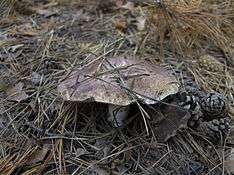Sarcodon leucopus
Sarcodon leucopus is a species of tooth fungus in the family Bankeraceae. Found in Asia and Europe, it was described as new to science in 1825 by Christian Hendrik Persoon.[1] Mycologists Rudolph Arnold Maas Geesteranus and John Axel Nannfeldt transferred it to the genus Sarcodon in 1969.[2] Fruit bodies of the fungus have flattened to slightly depressed caps up to 20 cm (8 in) in diameter. The surface texture, initially finely felt-like, later cracks to form shiny scales. Its color is pale purplish-brown to dark brown. The stipe measures 4–8 cm (1.6–3.1 in) long by 2–6 cm (0.8–2.4 in) thick. Spines on the cap underside are up to 15 mm long and about 1 mm thick. The flesh has a disagreeable odor, and a bitter taste. Spores are roughly spherical, typically measuring 7.2–7.9 by 4.5–5.6 µm.[3] The fungus is considered endangered in Switzerland.[4]
| Sarcodon leucopus | |
|---|---|
 | |
| in Akademgorodok, Novosibirsk, Russia | |
| Scientific classification | |
| Kingdom: | |
| Division: | |
| Class: | |
| Order: | |
| Family: | |
| Genus: | |
| Species: | S. leucopus |
| Binomial name | |
| Sarcodon leucopus | |
| Synonyms | |
| |
Fruit bodies of Sarcodon leucopus contain novel compounds called sarcoviolins that have been shown to have antioxidative and α-glucosidase inhibitory activity.[5]
References
- Persoon CH. (1825). Mycologia Europaea (in Latin). 2. Erlangen: Palm. p. 158.
- Maas Geesteranus RA; Nannfeldt JA. (1969). "The genus Sarcodon in Sweden in the light of recent investigation". Svensk Botanisk Tidskrift. 63: 401–440 (see p. 415).
- Maas Geesteranus RA. (1975). "Die terrestrischen Stachelpilze Europas". Verhandelingen Koninklijke Nederlandse Akademie van Wetenschappen Afdeling Natuurkunde. 2 (in German). 65: 103.
- Senn-Irlet B; Bieri G; Egli S. (2007). Lista Rossa Macromiceti. Lista Rossa delle specie minacciate in Svizzera. UV-0718-I (Report) (in Italian). Bern: Ufficio federale dell’ambiente.
- Ma K; Han J; Bao L; Wei T; Liu H. (2014). "Two sarcoviolins with antioxidative and α-glucosidase inhibitory activity from the edible mushroom Sarcodon leucopus collected in Tibet". Journal of Natural Products. 77 (4): 942–947. doi:10.1021/np401026b.